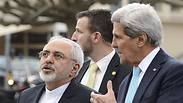
Kerry and Iran's Zarif meet as Iran responds to US threat to leave talks
Iran responds to US warnings, saying that 'staying or leaving depends on us', as top diplomats meet to to narrow gaps in nuclear talks
A senior Iranian official is responding sharply to warnings that Washington is ready to quit nuclear talks unless Tehran agrees to a deal that demonstrates it does not want atomic arms, as the two countries' tops diplomats met to address "fundamental gaps" in nuclear negotiations.
Ali Akbar Velayati responded to the US, by saying that staying or leaving "depends on the Americans."
In #Geneva today for #IranTalks. Met with #Iran FM @JZarif for continued discussions. pic.twitter.com/0kC4XOv9BA
— John Kerry (@JohnKerry) February 22, 2015
Velayati was responding to US Secretary of State John Kerry, shortly before Kerry's arrival Sunday to Geneva. Kerry said President Barack Obama was "fully prepared" to pull the US out before accepting a deal leaving Tehran with potent nuclear arms-making ability.
Their exchange may be an attempt to play to their home audiences but could also signal difficulties at the talks with only a month to go to a first-stage deal. Iran says it does not want such weapons but is negotiating in hopes of sanctions relief.
Meanwhile, Kerry and his Iranian counterpart Mohammad Javad Zarif met to try to narrow gaps in another round of nuclear talks in Geneva on Sunday as they press to meet a March 31 deadline for a political framework agreement.
Before Kerry arrived in Geneva, Zarif told Iranian state media that mid-level bilateral talks had produced "good discussions but no agreements", and some differences remained.
"The fundamental gap, in my view, is psychological. Some Western countries, the United States in particular, see sanctions as an asset, a lever to exert pressure on Iran. As long as this thinking persists it will be very hard, difficult to reach a settlement."
Kerry did not make remarks on his arrival in Geneva, where he was first meeting members of the US delegation before sitting down with Zarif.
Joining the talks for the first time are US Secretary of Energy Ernest Moniz and Salehi, as well as a close aide and the brother of Iranian President Hassan Rouhani, Hossein Fereydoon.
Zarif said this reflected a need "for higher level people with all-embracing command over all issues", while Fereydoon was involved for better "coordination with the president".
Kerry said on Saturday the presence of Moniz reflected the highly technical nature of the current talks and in no way meant "that something is about to be decided".
"There is still a distance to travel," Kerry said in London where he met British Foreign Secretary Philip Hammond.
The negotiations between Iran and "P5+1" powers - the United States, Britain, France, Germany, Russia and China - have reached a sensitive stage with divisions remaining, mainly over Iranian uranium enrichment and the pace of removing sanctions.
A recent UN report said that Iran had refrained from expanding tests of more efficient models of a machine used to refine uranium under a nuclear agreement with the six world powers. Development of advanced centrifuges is feared to lead to material potentially suitable for manufacture of nuclear bombs.
Iran says it does not intend to develop atomic bombs.
Kerry said US President Barack Obama was not inclined to extend the talks again. The parties already missed a November 2014 target date.
Obama believed it was "imperative to be able to come to a fundamental political outline and agreement within the time space that we have left," Kerry said.
Zarif said Rouhani would not accept a small, short-term agreement, nor a broad accord that left room for interpretation.
Prime Minister Benjamin Netanyahu, increasingly critical of US policy, said it was "astonishing" that the talks, which could end by allowing Iran "to develop the nuclear capabilities that threaten our existence", were proceeding.
Any agreement would be "dangerous for Israel, the region and the entire world," Netanyahu said on Sunday.
Reuters and the Associated Press contributed to this report










